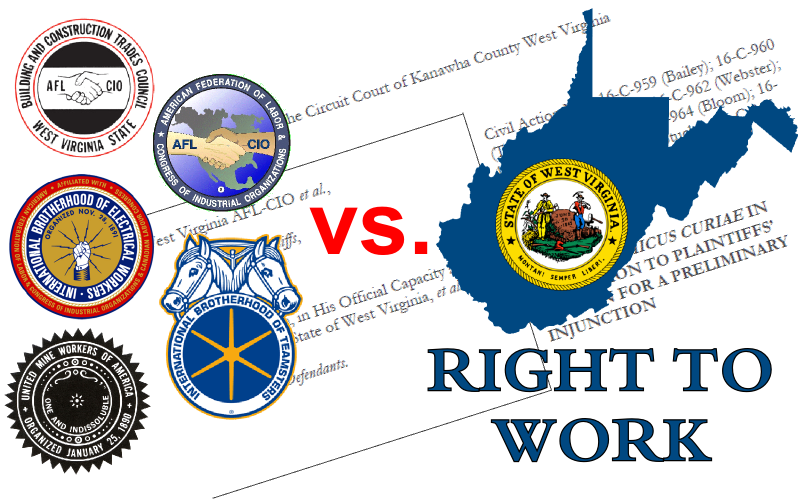West Virginia Supreme Court Cites Foundation-Won Janus Case in Decision to Uphold Right to Work Law
In April the West Virginia Supreme Court upheld West Virginia’s Right to Work law, ending a multi-year union boss legal challenge.
National Right to Work Foundation Vice President and Legal Director Raymond LaJeunesse wrote an article for The Federalist Society analyzing the decision in the case: Morrisey v. West Virginia AFL-CIO. LaJeunesse just published piece highlights how the justices relied heavily on the Foundation-won Janus v. AFSCME U.S. Supreme Court decision to uphold the law protecting workers against being forced to subsidize union activities:
“Four of the five Justices concluded in Morrisey that the United States Supreme Court’s decision in Janus v. AFSCME, 138 S. Ct. 2448 (2018), required that result. Janus held that forcing nonmembers to pay union fees as a condition of public employment violates the First Amendment. As Justice Workman put it, concurring in the judgment of the Court in Morrisey, ‘there is no principled basis on which to conclude that under the legal analysis upon which Janus is based, a prohibition on the collection of agency fees is constitutional for public employees’ unions but unconstitutional for private employees’ unions.'”
Foundation staff attorneys filed 10 legal briefs in Morrisey in defense of West Virginia’s Right to Work law. Foundation President Mark Mix hailed the decision as a “a great victory for Mountain State employees.”
Since 2012, Foundation staff attorneys have defended and enforced five newly passed Right to Work in states including West Virginia.
Foundation Defends Michigan Teacher from Union Boss Money Grab as Union Sues for Dues Teacher Never Owed
Foundation helps teacher respond to Michigan Education Association lawsuit seeking collection of ‘back dues’ from her after she resigned her union membership
Ann Arbor, MI (April 24, 2020) – With free legal aid from the National Right to Work Legal Defense Foundation, Ann Arbor-area teacher Deborah Wolter is defending herself against Michigan Educators Association (MEA) union lawyers who filed a lawsuit claiming she owes thousands of dollars in back dues, despite the fact that the purportedly owed dues are for a period after she resigned her union membership. Under Michigan’s Right to Work law, nonmembers cannot be required to make any payments of union dues or fees.
As her response to the union lawsuit notes, Wolter does not owe MEA any dues because she resigned her union membership in August 2014. Because MEA’s demands for dues violate Michigan’s Right to Work law, Wolter’s attorneys are fighting to dismiss the union’s false claims that she owes them anything.
MEA union lawyers are suing Wolter for not paying dues as a nonmember, while Wolter’s attorneys charge the union lawsuit violates Michigan’s Right to Work law—which protects nonmembers from being forced to pay union dues or fees and allows workers to cut off all dues payments after resigning their union membership.
Union lawyers further claim in their lawsuit that Wolter did not resign union membership before she stopped paying dues, despite Wolter’s August 2014 resignation. As her legal filings state, Wolter “terminated her membership in both law and fact,” and therefore does not owe MEA union bosses anything.
Last year, Foundation staff attorneys won a victory for two other teachers at Wolter’s school facing similar demands from officials of the Ann Arbor Education Association (AAEA), an MEA affiliate. In that case, the Michigan Court of Appeals ruled AAEA violated the rights of teachers Jeffrey Finnan and Cory Merante under Michigan’s Right to Work Law by demanding that they continue to pay union fees even though they had resigned their union membership.
Since Michigan passed its Right to Work law, which became effective in March 2013, Foundation staff attorneys have brought over 120 cases for Michigan workers subjected to coercive union boss tactics.
“It is despicable that Michigan union bosses yet again are demanding forced union dues in violation of Michigan’s Right to Work law,” commented National Right to Work Foundation President Mark Mix. “The National Right to Work Foundation is proud to stand with Michiganders who are exercising their rights under Michigan’s Right to Work law that makes union financial support strictly voluntary.”
Milwaukee Worker Files Federal Charges Against Teamsters Union for Violating His Rights under State and Federal Law
NLRB Charge: Despite Right to Work law, union bosses coerced worker into becoming a union member and then blocked attempts to cut off dues payments
Milwaukee, WI (March 3, 2020) – With free legal aid from National Right to Work Legal Defense Foundation staff attorneys, an employee at a Milwaukee factory has filed federal charges against Teamsters “General” Local Union No. 200 for violating his rights under the National Labor Relations Act (NLRA) and Wisconsin’s Right to Work law.
Tyler Lewis, employed by Snap-on Logistics Company, filed an unfair labor practice charge with the National Labor Relations Board (NLRB) after union officials told him that he must become a union member and pay membership dues as a condition of employment in violation of longstanding federal law.
Teamsters union officials further refused to allow Lewis to stop union dues from being seized from his paycheck even after he learned of his rights and resigned his union membership in September 2019. Moreover, union officials continue to deduct dues from his paycheck and refuse to refund Lewis any of the dues unlawfully seized from him.
Forcing workers to pay union dues or fees as a condition of employment is prohibited under Wisconsin’s Right to Work law, which went into effect in March 2015. However, union officials continued to accept and retain union dues seized from Lewis because they claimed he could only cut off union dues deductions during a narrow union-created “window period.” Even as they made that claim, they failed to provide Lewis with specific dates when his request would be accepted under their rules.
As his charge details, the union monopoly bargaining agreement in Lewis’ workplace, which was signed after the state Right to Work law went into effect, contained language prohibited by the Right to Work law that workers must pay union dues or fees as a condition of employment. Moreover, even if the agreement was actually in place prior to the law’s effective date, Lewis’ Foundation-provided attorneys state in the filing that the passage of the Right to Work law invalidated the union’s claim that Lewis’ right to stop dues payments was limited to a brief union window period.
“Once again, Teamsters union bosses are using coercive tactics to force workers they claim to ‘represent’ to pay union dues and fees against their wishes,” said National Right to Work Foundation President Mark Mix. “Wisconsin’s Right to Work law should mean union membership and dues payment are strictly voluntary, but rather than respect workers’ rights and work to win their uncoerced support, union bosses are again attempting to trap workers in forced dues in violation of federal law.”
AT&T Employee Wins Settlement from CWA Union after Facing Union Retaliation for Exercising Legal Rights
Union officials refused to allow worker to resign his union membership while on military leave and attempted to fine him in violation of federal labor law
Jacksonville, FL (January 24, 2020) – AT&T employee Jared Brewer has won a favorable settlement from Communication Workers of America (CWA) Local 3106 union with free legal aid from the National Right to Work Legal Defense Foundation after union officials violated his legal rights under federal law.
To end the case, union officials rescinded their threat to subject Brewer to internal union “discipline” and fine him for exercising his legal rights under the National Labor Relations Act (NLRA). They also were required to notify other workers of their legal rights by posting notices on the union’s bulletin boards at 22 AT&T Jacksonville facilities.
Brewer was on military leave when union officials called a strike in August 2019. He sent an email to them in which he resigned his union membership. Even though the NLRA guarantees employees the right to resign their union membership at any time, union officials refused to honor Brewer’s request. One union representative falsely claimed that his resignation letter was “untimely.”
After sending a certified letter containing the same resignation language, Brewer returned to work. Despite his resignation, union officials told Brewer in an October letter that they were bringing charges against him in an internal union “trial” for working during the union-initiated work stoppage. Brewer did not attend the November 7 “trial” because he had already resigned his union membership and, therefore, could not legally be subject to union disciplinary procedures.
Union officials notified Brewer on November 15 that the union found him guilty at its “trial” and imposed a monetary fine of more. They threatened him with legal action if he did not pay the fine within 21 days.
In response, Brewer filed an unfair labor practice charge with the National Labor Relations Board with free legal aid from Foundation staff attorneys. Brewer charged that union officials violated his legal rights under the NLRA by disciplining and fining him as a nonmember, and by denying his resignation. Union officials are prohibited from requiring formal union membership as a condition of employment by both Florida’s Right to Work law and the NLRA, and under the NLRA workers are free to resign their union membership at any time.
Brewer’s unfair labor practice charges drove union officials to settle. This requires union officials to honor Brewer’s resignation and rescind the fine and union “discipline” against him. Union officials also must post for 60 days in its union hall and numerous AT&T facilities a notice in which the union promises not to “restrain or coerce” workers from exercising their legal rights to resign and work during strikes.
“Faced with legal action from National Right to Work Foundation staff attorneys, CWA union officials backed down from their blatant violations of longstanding labor law and were forced to settle with Mr. Brewer,” said National Right to Work Foundation President Mark Mix. “Federal labor law is crystal clear: Workers have an absolute right to resign their union membership if they choose, and once a worker has exercised that right they cannot be subject to fines levied by any internal union boss kangaroo court.”
Featured Article: “The Future Looks Bright for the Right to Work Movement”
The Regulatory Review has ranked the essay entitled “The Future Looks Bright for the Right to Work Movement” by National Right to Work Foundation Vice President and Legal Director Raymond J. LaJeunesse, Jr. as one of the publication’s top essays in 2019.
The essay highlights successes in the ongoing fight against forced unionism through legal and legislative reform:
Thomas Jefferson famously said that it is “sinful and tyrannical” for government “to compel a man to furnish contributions of money for the propagation of opinions which he disbelieves and abhors.” That principle is consistent with the guarantees of freedom of speech and association enshrined in the U.S. Constitution’s First Amendment. Yet, some federal and state labor laws in this country have long authorized requirements that workers pay union dues as a condition of employment, requirements known as the “union shop” or “agency shop.” Increasingly, however, legislatures and courts are recognizing that workers have a constitutional right to work without being forced to subsidize a union.
Among recent achievements for the Right to Work movement are five new state Right to Work laws passed since 2012 and the landmark Foundation-won Janus v. AFSCME Supreme Court decision in June 2018.
The complete essay is available to read online here.
Healthcare Worker Sues Teamsters Union and Healthcare Facility for Violating West Virginia Right to Work Law
Former Tygart Center employee says union officials and employer violated her legal rights by demanding she join the union and pay union dues and fees to keep her job
Fairmont, WV (December 24, 2019) – With free legal aid from the National Right to Work Legal Defense Foundation, healthcare worker Donna Harper filed a lawsuit against Teamsters Local 175 and the Tygart Center for violating her rights under the State of West Virginia’s Right to Work law.
West Virginia’s Right to Work law prohibits requiring workers to pay union dues or fees just to get or keep a job. In defiance of West Virginia’s Right to Work law, Tygart Center and Teamsters union officials entered into a collective bargaining agreement that required employees to pay union dues and fees as a condition of employment.
When Harper was hired, Tygart Center officials informed Harper that she must become a union member and pay union dues as a condition of employment in violation of her legal rights. Tygart Center officials deducted full union membership dues and fees from Harper’s paycheck and remitted this money to Teamsters union officials.
In March 2019, Harper successfully exercised her legal rights by resigning her union membership. Even then union officials continued taking union dues from her paycheck. Union officials also never fully refunded the union dues unlawfully seized from her wages.
Foundation staff attorneys filed the suit against the Tygart Center and the Teamsters union for Harper in Marion County Circuit Court. Harper worked at the Tygart Center from February 2018 until September 2019 as a Laundry Aide and as a Certified Nursing Assistant.
Foundation staff attorneys also filed an amicus brief for Harper with the West Virginia Supreme Court defending the state Right to Work law against a protracted lawsuit brought by several unions seeking to overturn the law and restore union officials’ power to have workers fired for refusing to pay union dues or fees. That case is scheduled for oral arguments in the Supreme Court on January 15. That court has already rejected the unions’ arguments once, overturning a preliminary injunction against the Right to Work law.
“Teamsters union bosses demonstrated a blatant disregard for the law by illegally demanding Ms. Harper and her coworkers pay union dues and fees just to get or keep their jobs,” said National Right to Work Foundation President Mark Mix. “Contrary to Big Labor’s wishes, West Virginia’s Right to Work law is in full effect, meaning all union dues for workers covered by the law must be completely voluntary.”










